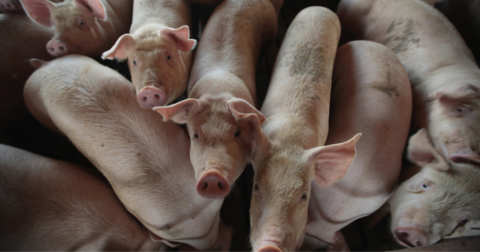News
Sentient Impact Report 2025
Policy•1 min read
Feature
Another day, another dollar, another attempt by the GOP to repeal the animal welfare law.


Words by Seth Millstein
Last week, Congressional Republicans launched another attempt to repeal California’s Proposition 12, the landmark animal welfare law. Iowa Republican Rep. Ashley Hinson introduced the Save Our Bacon Act on July 23, and the House Committee on Agriculture held a hearing the same day on Prop 12’s ramifications on agricultural producers. But despite some claims made at the hearing, not all farmers oppose the law. In fact, some actively support it.
Proposition 12 bans the extreme confinement of pigs, egg-laying hens and veal calves, and requires farmers to give the animals enough space to stand up, turn around and extend their limbs. It specifies exactly how much space each species must be given, and bans the in-state production and sale of pork, eggs and veal that weren’t produced in accordance with these standards.
At last week’s hearing, members of the National Pork Producers’ Council warned that Proposition 12 increases costs for pork farmers, and thus threatens their livelihoods. But hog farmer Brent Hershey, a 42-year industry veteran from Pennsylvania whose farms produce 78,000 pigs a year, tells Sentient that Proposition 12 has been nothing but good for his business.
“Every measurement of production that we do — and we measure production every day, every week, every month, with various things — every measurement stayed the same or improved,” Hershey says of the law’s impact on his farms. “It’s been all success.”
Hershey isn’t the only producer who likes Proposition 12. Sentient spoke with several other hog farmers last year who also support the new requirements, and at last week’s hearing, Rep. Jim McGovern presented and entered into the record 150 letters from farmers who support Proposition 12.
Although the Save Our Bacon Act was introduced the same day, last week’s hearing ostensibly centered on Republicans’ 2024 Farm Bill proposal, officially the Farm, Food, and National Security Act of 2024.
The Farm Bill is a quinquennial legislative package that facilitates and undergirds significant aspects of America’s farming sector, and Congressional Republicans inserted language into their 2024 proposal that would prohibit states from enacting Proposition 12-like standards.
Congress didn’t ultimately pass a Farm Bill in 2024, as lawmakers couldn’t agree on what to include in it. Instead, they passed a short-term extension of the 2018 Farm Bill. Although Republicans haven’t yet released their next Farm Bill proposal, House Agriculture Committee Chair Rep. Glenn Thompson indicated at Wednesday’s hearing that he’ll attempt to include a Proposition 12 repeal in it.
“I look forward to working with my colleagues to include this provision in the upcoming Farm Bill reauthorization,” Thompson said in his opening remarks.
Legislators on both sides raised various issues relating to Proposition 12. Republican Rep. Zach Nunn of Iowa, the largest pork-producing state in the nation, called it “bad policy” and “an insult to every hardworking farmer in this country who’s been ‘doing it right’ for generations.”
By “doing it right,” Nunn is referring to the use of gestation crates, which were the standard enclosures for breeding pigs prior to Proposition 12.
Hershey calls the gestation crate system, in which pigs aren’t given enough room to stand up or turn around for months at a time, “a relic of the past” that “should never have happened” in the first place. “As we stepped back and looked at it more and more, we realized you can’t defend this,” Hershey says.
Hershey is sympathetic to animal welfare concerns, and has even opted to give his pigs twice as much room as Proposition 12 requires. But he also says that the more spacious enclosures have been good for business, as they’ve dramatically improved the health and longevity of his animals — and allowed him to sell his meat for a higher price.
“Our sow mortalities dropped dramatically,” Hershey says. “Our conception rates when we’re breeding our animals jumped two percent. Our sow heat stress that happened during periods of heat went away completely, because we spread the animals out, and they could spread out and get away from laying smack next to another animal. Our lameness that we treat animals for just dropped dramatically.”
The central point of contention in Proposition 12 is its restriction on in-state sales, as it means that farmers in other states have to adopt Proposition 12’s space requirements if they want to sell their products in California. Even though California only produces one percent of U.S. pork, it consumes 13 percent of all pork nationwide, making it a lucrative market for pork producers.
The National Pork Producers’ Council sued to overturn Proposition 12 after it passed in 2018, but the Supreme Court ruled in 2023 that it’s within California’s right to regulate the sale of agricultural products within its borders, and allowed the law to stand.
There have been several legislative proposals to repeal Proposition 12 as well, including the EATS Act, the Food Security & Farm Protection Act, various Farm Bill proposals, and now, the Save Our Bacon Act. In addition, the Trump administration is currently suing California in an attempt to overturn Proposition 12’s poultry-related provisions.
In general, Republican officials have been more eager to repeal Proposition 12 than Democrats, but the issue hasn’t entirely broken down on party lines. A small but vocal minority of Republican lawmakers strongly oppose Proposition 12 repeal, arguing that doing so would violate states’ rights and, separately, create an opening for Chinese pork producers to compete with American farmers.
Similarly, while Congressional Democrats haven’t pushed legislation to repeal Proposition 12, the Biden Administration supported the pork industry’s lawsuit against it, and former Biden Secretary of Agriculture Tom Vilsack warned that there would be “chaos” in the pork market unless Congress repealed or modified the law.
At the hearing, Democratic Rep. Angie Craig argued that repealing Proposition 12 would effectively punish producers who’ve already spent money to become Prop 12-compliant.
“Many pork producers have made significant financial investments to make their operations Prop 12-compliant to satisfy the desires of California’s consumers for premium pork products,” Craig said. “It would be unfair to the family farmers who updated their facilities to comply with new rules to keep or gain market access to change the rules on them after they’ve already made those investments.”
The hearing also featured testimony from various representatives of the pork industry. One was Patrick Hord, vice president of the National Pork Producer’s Council, who argued that allowing states to enact Proposition 12-like restrictions would result in an “unmitigated regulatory patchwork” of laws around the country that would imperil pork production.
“Whatever I do today could need to be changed when a new state decides they want a different housing standard,” Hord said. “These are expensive changes, and some farmers may exit the business amid this uncertainty.”
Hershey, however, thinks that this is “fear-mongering,” and isn’t concerned that allowing Prop 12 to stand would allow for an inconsistent patchwork of laws.
“The gestation crate [problem] was real. The gestation crate was something you could show to any group of people, and they’d be like, ‘what are you doing that for?’”
He also notes that plenty of other industries have been more than able to navigate different state laws regulating their products.
“I mean, look at the auto emissions,” he says. “Why do farmers think that they’re somehow exempt from real-life business?
As of this writing, a vote on the Save Our Bacon Act hasn’t yet been scheduled. It’s possible that, as with the EATS Act before it, Republicans will include it in their next Farm Bill proposal; however, the recently-passed “megabill” included many provisions that normally would have been included in the Farm Bill, casting doubt on whether Congress will attempt to pass a new version at all in 2025.
Regardless of what form it comes in, legislation to repeal Proposition 12 repeal faces an uncertain fate in the House of Representatives: At least 24 House Republicans have expressed opposition to repealing Proposition 12, and Republicans have only a seven-seat majority in the chamber.